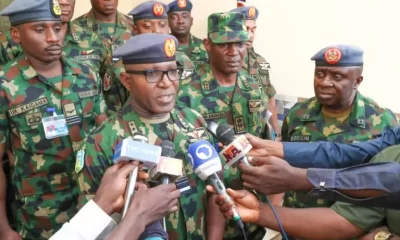News
Air Force flies out ex-CAS from service

The Nigerian Air Force (NAF) on Saturday, flew out of service, the immediate past Chief of Air Staff, Air Marshal Oladayo Amao.
Amao was replaced as Chief of Air Staff by President Bola Tinubu on June 19, a development that led to his immediate retirement from service.
The president named AVM Hassan Abubakar, as Amao’s replacement.
The Fly Out is a ceremony usually organised by the Nigerian Air Force for exiting Chiefs after a successful service to the Nation.
The ceremony also involves march past by troops, and flying out the retired officer.
In his valedictory speech, Amao expressed gratitude to God as well as the officers and men of the air force for a successful service to the nation.
He said the event marked a significant milestone in his career, which was fulfilling and full of accomplishments, culminating to his appointment as the 21st Chief of Air Staff.
He commented the “capable and dedicated officers and men for the roles they played in ensuring the safety and security of the nation.
“Your professionalism, skills and unwavering commitments have truly made a difference in the defence of our skies.
“During my tenure, we faced numerous challenges both at home and abroad.
“From complex joint operations to humanitarian missions, the Nigerian Air Force has demonstrated unmatched capabilities and tenacity in addressing the contemporary challenges.
“We have maintained a state of readiness adapting to the ever evolving threats and ensuring the protection of our airspace as well as safety and security of our dear country.
“It has been a great honour as well as a very challenging and yet fulfilling endeavor,” he said.
Amao also commended the efforts of his predecessors for laying the foundation upon which he built on to achieve the successes recorded during his tenure as the CAS.
He also thanked the immediate past service chiefs for the enhanced synergy that helped them achieve results, urging his successor to tow the same path for the greater good of the nation.
The News Agency of Nigeria (NAN) reports that the event was attended by the Permanent Secretary, Ministry of Defence, Dr Ibrahim Kana, the Chief of Defence Staff (CDS), Maj.-Gen. Christopher Musa and other service chiefs.
Also in attendance were ex-service chiefs, commanders from tri-service institutions and principal staff officers from defence and services headquarters, among others.
News
Woman killed while crossing road in Anambra

The Federal Road Safety Corps (FRSC), Anambra State Sector Command, has confirmed the death of a woman in an accident at Okpoko Market on the Asaba-Onitsha Road.
The Sector Commander, Mr Adeoye Irelewuyi, who confirmed the accident to journalists in Awka on Thursday, said that the woman was hit while she was crossing the road.
He said that the accident, which occurred on Wednesday, involved a commercial tow truck with registration number XA550BMA.
“Eyewitness report reaching us indicates that the truck was towing a vehicle in an uncontrollable speed along the axis.
“The vehicle that was being towed got detached from the tow truck.
“It hit and killed a female adult, who was said to be crossing the road, while the tow truck continued its movement.
“FRSC rescue team came to the scene and took the woman to Toronto Hospital, Onitsha, where she was confirmed dead and her body deposited at the hospital’s mortuary,” he said.
While sympathising with the family of the dead, the sector commander urged motorists, especially tow truck drivers, to exercise a high level of professionalism.
He also urged the drivers to always use standard equipment and avoid speeding.
News
LASG’s maize palliative impactful, says poultry association chair

The Chairman, Poultry Association of Nigeria (PAN), Lagos State Chapter, Mr Mojeed Iyiola, said the state government’s maize palliative to members of the association made a positive impact on the sector.
Iyiola said this in an interview with the News Agency of Nigeria (NAN) on Thursday in Lagos.
“We received about 150,000 tons of maize in February from the Lagos State government as palliative to cushion the effect of high feed prices.
“The major benefit of the palliative is that it actually cushioned the cost of production for most poultry farmers in the state.
“The palliative was beneficial as it made the cost of some poultry produce, especially eggs to drop,” Iyiola said.
He noted that prior to the palliative, a crate of egg was sold between N3,500 and N3,700 at the farm gate, but after the palliative, it now sells between N3,200 and N3,400.
According to the PAN chair, retailers and middlemen who sell from N3,800 to N4,200 do that for their personal gain.
“We have urged our members to sell their eggs at reasonable prices following the receipt of the palliative from the government.
“We appreciate the Lagos State government for the palliative but we also urge the federal government to do likewise, to further reduce the cost of production in the sector.
“This will consequently lead to drop in the prices of all poultry produce across board,” he said.
He said the palliative was shared among financial members of the association at no extra cost.
“As an association we shared the grains equally across PAN’s eight zones in the state equally. We also mandated each zone not the sell even a grain of the maize.
“We, however, considered new poultry farmers who wanted to the join the association as beneficiaries of the palliative,” said Iyiola.
He noted that through the palliative, more poultry farmers were recruited into the association.
“The maize was shared only to poultry farmers and not feed millers, it is the major component of poultry feed formulation,” he said.




















